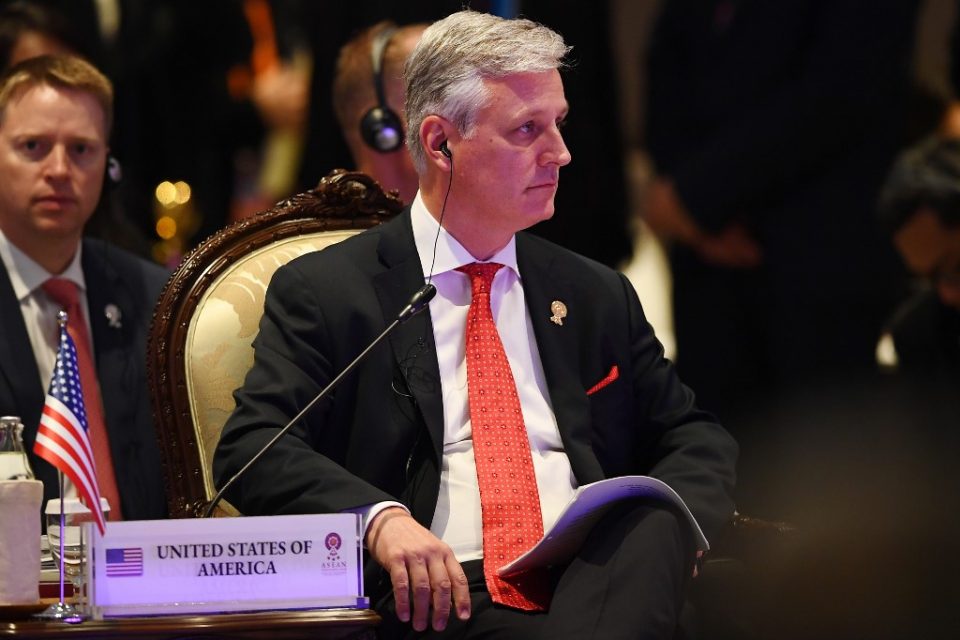
by with Shaun Tandon in Washington / Dene CHEN
BANGKOK, Thailand (AFP) — The United States on Monday accused China of intimidation in the South China Sea as it put forward its strongest language yet rejecting Beijing’s claims in the strategic, dispute-rife waters.
The Pacific powers traded tit-for-tat barbs over the South China Sea at a regional summit in Bangkok, with Beijing accusing the United States of ratcheting up tensions in the waters, a key global shipping route.
Beijing lays claim to huge swathes of the sea, where it is accused of building military installations and fake islands — and ramming fishing vessels.
US national security advisor Robert O’Brien urged freedom of navigation as he led Washington’s delegation to the summit of the Association of Southeast Asian Nations (ASEAN) and parallel East Asia Summit.
“Beijing has used intimidation to try and stop ASEAN nations from exploiting their offshore resources,” he said, addressing an ASEAN meeting Monday.
“Big countries should not bully other countries,” he later told reporters.
As the summit was wrapping up, the US State Department released a report on its Asia-Pacific strategy with unusually strong language denouncing China’s basis for its claims — the so-called nine-dash line.
Beijing’s “maritime claims in the South China Sea, exemplified by the preposterous ‘nine-dash line,’ are unfounded, unlawful and unreasonable,” the report said.
US leaders have been taking an increasingly sharp tone on China but have generally focused on encouraging all claimants to resolve disputes peacefully, rather than Washington taking a position itself.
Beijing claims the majority of the South China Sea through the nine-dash line, a vague delineation based on maps from the 1940s as the then Republic of China snapped up islands from Japanese control.
The communists declared themselves China’s sole representatives in 1949 after defeating the nationalists, who fled to Taiwan.
Questions on US commitment
At the ASEAN summit, China’s deputy foreign minister Le Yucheng accused some outside countries of “meddling” in the sea, answering a question on US comments about the waters.
“Some non-regional countries cannot live with calm waters in the South China Sea and have come all this way to make waves,” he said, in an apparent jab at the US.
In return, O’Brien later said “we don’t think we’re meddlers”.
“We always come when we’re invited, unlike other countries,” he said after Le’s comments emerged.
Vietnam, Taiwan, Philippines, Malaysia and Brunei all have claims in the South China Sea.
Tensions have flared in the flashpoint waterway in recent weeks after China deployed a survey ship to waters claimed by Hanoi.
Though the communist neighbors have long feuded over the sea, Vietnam had sought a forceful, specific condemnation of China at ASEAN over the latest incident.
Despite the strong language from the United States in its report, some observers questioned its level of commitment.
O’Brien was the lowest-level official ever sent by the United States to an East Asia Summit since Washington successfully won an annual invitation starting in 2011.
The summits are usually attended by heads of state, but a US official said President Donald Trump — who on Saturday watched a mixed martial arts championship in his home city of New York — was busy with campaign events.
But the State Department report said that the United States was stepping up its engagement with key partners in Asia including India and allies Japan and South Korea.
“We are committed to upholding a free and open Indo-Pacific in which all nations, large and small, are secure in their sovereignty and able to pursue economic growth consistent with international law and principles of fair competition,” the report said.
Chinese Premier Li Keqiang on Sunday offered a conciliatory tone on the South China Sea, saying that Beijing was committed to progress on a code of conduct aimed at setting guidelines and reducing tensions.
But China has repeatedly delayed regional efforts on such guidelines, instead seeking bilateral understandings as it ramps up its involvement in the sea.
© Agence France-Presse







